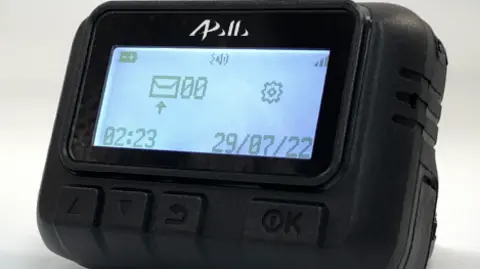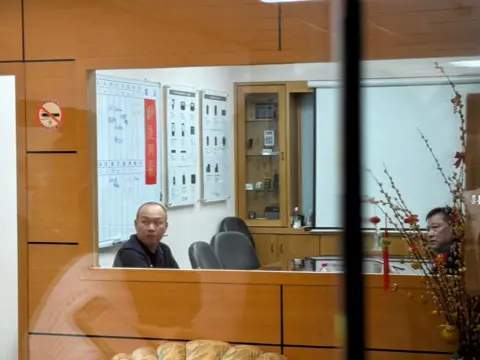ARTICLE AD BOX

 BBC
BBC
The hunt for the firm behind the exploding pagers has led to Taiwan-based Gold Apollo
The race to find the maker of the pagers that exploded in Lebanon has taken an unexpected turn - towards a Taiwanese company few had heard of until this morning.
At least 12 people were killed and nearly 3,000 injured in Tuesday's explosions targeting members of the armed group Hezbollah, which set off a gepolitical storm in the Middle East.
Caught in the crisis, Taiwanese firm Gold Apollo's founder Hsu Ching-Kuang flatly denied his company had anything to do with the attacks.
Instead, Mr Hsu has said he licensed his trade mark to a company in Hungary called BAC Consulting to use the Gold Apollo name on their own pagers. BBC attempts to contact BAC have so far been unsuccessful.
“You look at the pictures from Lebanon,” Mr Hsu told reporters outside his firm's offices on Wednesday. "They don’t have any mark saying Made in Taiwan on them, we did not make those pagers!”
The offices of Gold Apollo are in a large new business park in a non-descript suburb of Taiwan's capital, Taipei.
They look the same as any of the thousands of small trading companies and manufacturers that make up a huge chunk of the island's economy - except for the two police officers posted at the entrance, ready to fend off the large gaggle of reporters and TV crews squatting outside.
On the walls of Gold Apollo's office are posters of the company’s products – a montage of small boxy plastic devices with little grey LCD screens. They are all pagers.
Until this morning the company’s website had a page devoted to each, extolling its virtues and practicalities. But as soon as news broke that Gold Apollo was the alleged source of the devices used in the attacks in Lebanon, the website went offline.
Mr Hsu said it was pagers made by BAC Consulting that were used in the Lebanon attacks. He told reporters that his company had signed an agreement with BAC Consulting three years ago.
The money transfers from BAC had been "very strange", he added. There had been problems with the payments, which had come through the Middle East, he told reporters, but he did not go into detail.
Initially, he said, BAC wanted to buy pagers from Gold Apollo to sell in Europe. But after about a year they came up with a new plan to make their own pagers and licensed Gold Apollo's name.
"We only provide brand trademark authorisation and have no involvement in the design or manufacturing of this product,” a statement from Gold Apollo said.
But the fact there is now a team from the Taipei investigation bureau inside his office – with large numbers of carboard boxes - suggests the Taiwanese authorities are not entirely reassured.

 Joy Chiang/ BBC
Joy Chiang/ BBC
Police are now investigating the firm's links to the pagers
Nevertheless, Mr Hsu’s statement that his company didn’t make the devices is plausible.
Taiwan’s manufacturing system is a complex maze of small companies, many of which do not actually make the products they sell. They may own the brand name, the intellectual property and have research and design departments. But most of the actual manufacturing is farmed out to factories in China or Southeast Asia.
Pagers are also hardly cutting-edge technology – there are many companies across the world capable of making them.
They are small radio receivers with LED screens that can receive and display messages. In the 1980s and 1990s electronic pagers were considered to be the latest tech, used by tens of millions of people. Before mobile phones, companies used pagers to send short text messages to employees in the field.

 Joy Chiang/ BBC
Joy Chiang/ BBC
The BBC visited the office of Gold Apollo in Taiwan's capital, Taipei
But in the last two decades the rise of the smart phone has pushed pagers to the brink of extinction. They are now a niche device holding on in places like hospitals – where they remain a cheap and reliable method for messaging doctors and nurses, even when other communication lines are disrupted.
Starting in the late 2000s, Gold Apollo too started moving away from making electronic pagers and started manufacturing other short-range radio devices – particularly for restaurants. The company’s most successful product now is a round disc that is handed to customers in food courts and restaurants once they place an order - it lights up and vibrates when their order is ready.
It's likely that Gold Apollo's brand name - as a reliable pager manufacturer - was useful in selling the pagers that ended up with Hezbollah.
But there are still more questions than answers in this extraordinary story.
We know almost nothing about BAC Consulting - who is or was behind it?
If Gold Apollo did not make the pagers used in the attack in Lebanon, then who did and where?

 4 months ago
21
4 months ago
21








 English (US) ·
English (US) ·